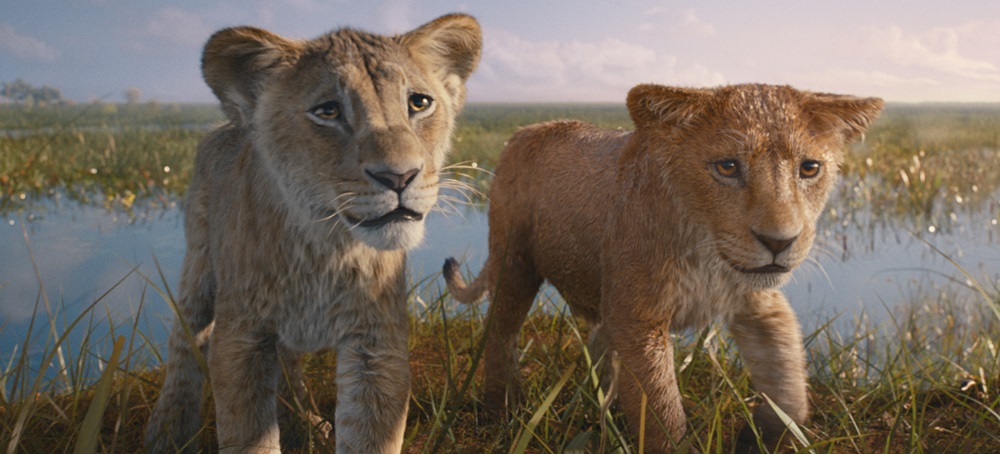
Lion King Prequel Mufasa Roars to Life
If Disney’s 2019 The Lion King remake showcased the studio and its 21st-century fascination with transforming many of its timeless animated favorites into live-action duplicates (or something superficially similar) at their most brazenly soulless, turning to Oscar-winner Barry Jenkins (Moonlight) to helm Mufasa: The Lion King is an equally brash — if still odd — stroke of genius.
Even though he’s working with cutting-edge technological tools that blur the line between fantasy and reality with eye-popping grandeur, Jenkins still prioritizes character over spectacle. He creates a photorealistic tale of the natural world and its inhabitants, and even if his film isn’t entirely successful, it still captured my attention.
Unburdened by having to photocopy the 1994 hand-drawn animated classic the same way director Jon Favreau did in 2019, Jenkins isn’t afraid to allow his animals to take on a few human qualities. He sacrifices perfection to achieve emotional expression. The filmmaker tackles this prequel as if it were an animated film and, even better, Disney allows him that freedom.
In Mufasa, the characters get to have facial movements that are slightly unnatural compared to their real-world doppelgängers roaming the windswept plains of the African wild. However, this retreat from realism is exactly what this story needs. Jenkins knows he and his talented creative team are working in a digital environment. As such, he gives his cast of lions, primates, warthogs, and various other Serengeti creatures human qualities similar to traditional animation. This is what makes his first foray into big-budget, Hollywood-blockbuster territory interesting.
It’s still far from perfect, and despite his best efforts, Jenkins encounters several obstacles Favreau couldn’t overcome. Chief among them is that, even with a talented vocal cast, an ensemble made up almost entirely of photorealistic lions remains a visual nightmare. While there are subtle color variations between the two main characters (the royal-blooded Taka and his adopted brother Mufasa), they frequently look exactly alike. It’s worse for the lionesses, especially when they are on-screen together, and this makes keeping track of who is who a tiresome chore.
Another item that didn’t work for me was the music. As talented as composer Dave Metzger (Wish) and songwriter Lin-Manuel Miranda (Encanto) are, the orchestral high points have everything to do with Hans Zimmer, Elton John, and Tim Rice and precious little with them. The callbacks to The Lion King are effective, but the new songs (most of which I sadly found dreadful) are decidedly not.
While the screenplay is fully credited to writer Jeff Nathanson (Catch Me If You Can, Young Woman and the Sea), I’m certain Jenkins had plenty of input. The plot hits on themes familiar to anyone who has watched any of the director’s previous endeavors, most notably Medicine for the Melancholy, Moonlight, and If Beale Street Could Talk. This is particularly true of threads involving found family, racial (species?) identity, economic disparity, and gender equality.
The difference? Unlike his more adult fare, he makes these complex topics comfortably understandable (and even more relatable) to even the youngest viewers. Jenkins does this by not talking down to them, instead treating them with intelligence and respect. He breaks events down into their basic elements, and even though it’s always clear who the villain and hero are, he still lets pernicious shades of gray add a layer of thoughtful ambiguity.
The origin of the mighty Mufasa is told in flashback to Simba (voiced by Donald Glover) and Nala’s (Beyoncé Knowles-Carter) youngest, Kiara (Blue Ivy Carter), by wise mandrill Rafiki (John Kani). When the cub Mufasa (Braelyn Rankins) is swept away in a flashflood, he is rescued by rambunctious upstart Taka (Theo Somolu), the royal son of the cantankerous Obashi (Lennie James) and nurturing Eshe (Thandiwe Newton). The youngsters quickly form a brotherly bond, one they assume will never be broken.
Later on, as the pair grow to adulthood, Mufasa and Taka (now voiced by Aaron Pierre and Kelvin Harrison Jr., respectively) are forced to flee when Obashi’s domain is invaded by a vicious pride of white lions, led by the murderous Kiros (Mads Mikkelsen). As they make their way to a fabled domain of peace and prosperity, they are joined by the lioness Sarabi (Tiffany Boone), a young Rafiki (Kagiso Lediga), and the talkative hornbill Zazu (Preston Nyman). During their journey, Taka begins to give in to his fear that Mufasa will someday prove more worthy of leadership than he, even with his royal blood (thus taking the first steps that will transform him into the Machiavellian traitor Scar in the future).
It’s all purposefully basic, with Nathanson pulling from the story of Moses, Greek mythology, and — like the original The Lion King — Shakespeare for his narrative designs. Jenkins keeps it clear as to why things transpire, only halting the melodramatic character interactions for a Broadway-inspired show tune or a quick bit of comedic goofiness from returnees Timon (Billy Eichner) and Pumbaa (Seth Rogen).
I admit I find it hard not to grade this prequel on a curve. The 2019 version of The Lion King was so abominable that the very thought of it makes my skin crawl. So, even with all its missteps and faults, that Jenkins has made something watchable out of a follow-up can’t help but feel like a rousing victory.
Even so, Mufasa: The Lion King has enough going for it that it stands on its own with pride. Jenkins is a talented filmmaker, and while I can’t wait until he returns to projects made on practical sets and featuring actors not constructed inside of a computer, he utilizes this collection of technological tools with remarkable skill. He cares for these characters, and he has even more regard for his audience — both of which are worthy of a roar of enthusiastic appreciation.
– Review reprinted courtesy of the SGN in Seattle
Film Rating: 2½ (out of 4)








